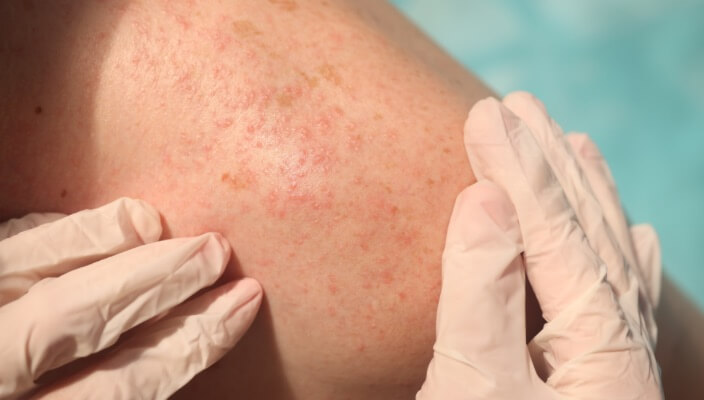Eczema and Seasonal Changes: How to Keep Your Skin Happy Year-Round
 Eczema, a chronic skin condition characterized by inflammation, itchiness, and dryness, can feel like an ever-present challenge. Yet, for many people, its impact fluctuates with the seasons. Shifting temperatures and changes in humidity can aggravate eczema, leading to flare-ups that disrupt daily life. Understanding how each season affects eczema allows you to take proactive steps, ensuring your skin remains healthy, hydrated, and happy throughout the year.
Eczema, a chronic skin condition characterized by inflammation, itchiness, and dryness, can feel like an ever-present challenge. Yet, for many people, its impact fluctuates with the seasons. Shifting temperatures and changes in humidity can aggravate eczema, leading to flare-ups that disrupt daily life. Understanding how each season affects eczema allows you to take proactive steps, ensuring your skin remains healthy, hydrated, and happy throughout the year.
How Seasonal Changes Affect Eczema
Environmental factors such as weather and air quality can influence the severity of eczema. Each season brings unique triggers, and being aware of these can make a big difference in managing symptoms.
Winter: The Dry Skin Dilemma
Winter is often the toughest season for people with eczema. Cold air outside, combined with dry indoor heating, creates the perfect storm for flare-ups. Low humidity levels cause moisture to evaporate from the skin, leaving it vulnerable to dryness, cracking, and irritation. Here’s a breakdown of common winter eczema challenges:
- Low humidity levels: The dry, cold air pulls moisture from the skin, exacerbating symptoms of eczema.
- Harsh winds: Windy days can lead to skin irritation and increase dryness, especially on exposed areas like the face and hands.
- Indoor heating systems: Central heating and space heaters lower indoor humidity levels, further drying out the air and the skin.
- Irritating fabrics: Materials like wool or rough synthetics can worsen eczema symptoms, causing itchiness and rashes.
To manage eczema during the winter, focusing on moisture retention and protecting your skin from the elements is crucial. Here are some tips for protecting your skin in colder months:
- Hydrate frequently: Use emollient-rich moisturizers or ointments that help lock moisture into the skin. Opt for products containing ceramides or hyaluronic acid, as these ingredients provide extra hydration and skin barrier protection.
- Wear soft, breathable fabrics: Choose materials like cotton that allow your skin to breathe, and avoid rough fabrics that can irritate sensitive skin.
- Use a humidifier: Maintain indoor humidity levels between 30% and 50% to add moisture to the air, keeping your skin hydrated.
- Cover exposed skin: When heading outdoors, protect your skin with scarves, gloves, and moisturizers that create a barrier from the wind.
Watch: Dr. Frank Tobin Discusses Eczema Symptoms
Summer: Balancing Heat and Hydration
While winter is notorious for its drying effects, summer comes with its own set of challenges. Hot weather, sweating, and sun exposure can aggravate eczema in different ways. The heat can increase sweat production, which, when trapped against the skin, can cause itching and irritation. Additionally, UV rays can further inflame eczema-prone skin, leading to flare-ups.
Key summer eczema triggers include:
- Excessive sweating: Heat and physical activity can cause sweat to accumulate on the skin, leading to irritation, itching, and flare-ups.
- Sun exposure: Overexposure to UV rays can not only dry out the skin but also trigger eczema, causing redness and discomfort.
- Airborne allergens: Pollen and other allergens tend to increase during the summer months, contributing to eczema flare-ups in sensitive individuals.
To manage eczema during the summer, focus on keeping your skin cool and minimizing exposure to allergens and irritants. Follow these tips for a comfortable summer season:
- Wear protective, breathable clothing: Opt for lightweight fabrics like cotton, which allow air circulation and reduce the risk of overheating.
- Stay in the shade: When outdoors, seek shade or wear wide-brimmed hats to limit direct sun exposure.
- Choose the right sunscreen: Look for sunscreens with mineral-based ingredients like titanium dioxide or zinc oxide. These options are less likely to irritate sensitive skin than chemical-based sunscreens.
- Rinse after sweating: Sweat can trigger eczema flare-ups, so be sure to rinse off after physical activity to prevent further irritation.
Tips for Eczema Care Throughout the Year
Eczema management isn’t limited to specific seasons—it’s about maintaining a consistent skincare routine that adapts to environmental changes. Here are general tips to help you manage eczema throughout the year:
- Keep your skin moisturized: Apply moisturizers that lock in hydration after showers, before bed, and whenever your skin feels dry. Products with colloidal oatmeal, glycerin, or shea butter can provide additional soothing benefits.
- Adjust your skincare routine: Modify your skincare products based on the season. In winter, use heavier creams or ointments, while in summer, switch to lighter lotions that allow your skin to breathe.
- Monitor environmental triggers: Be mindful of your exposure to common eczema triggers like pollen, pet dander, and dust mites, as these allergens can worsen eczema symptoms regardless of the season.
- Stay hydrated: Drink plenty of water year-round to keep your skin hydrated from within.
Eczema management isn’t limited to specific seasons—it’s about maintaining a consistent skincare routine that adapts to environmental changes.
Take Control of Your Eczema with Expert Help
Managing eczema can feel overwhelming, especially when the seasons are constantly shifting. However, you can significantly reduce flare-ups and maintain healthier skin by understanding the impact of weather changes and adjusting your skincare routine accordingly. If you’re struggling with eczema despite trying these tips, Pinnacle Dermatology is here to help. Our dermatologists can provide personalized treatment plans to manage your eczema all year long. Schedule an appointment and take the next step towards healthier skin.
Featured Blogs

- General Dermatology
- Chronic Skin Conditions
Eczema, a chronic skin condition characterized by inflammation and intense itching, can be challenging to manage, especially during flare-ups.
Read More
- General Dermatology
- Skin Exams
- Chronic Skin Conditions
Explore our comprehensive guide to gain insights into accurate diagnosis and expert care for chronic skin conditions.
Read More
- Skin Cancer
- General Dermatology
- Skin Exams
Explore the crucial role dermatologists play in safeguarding skin health, offering insights into skin cancer prevention, early detection, and comprehensive treatment options.
Read MoreFeatured Products for Eczema Relief
Check your local office for current stock!
Check your local office for current stock!



